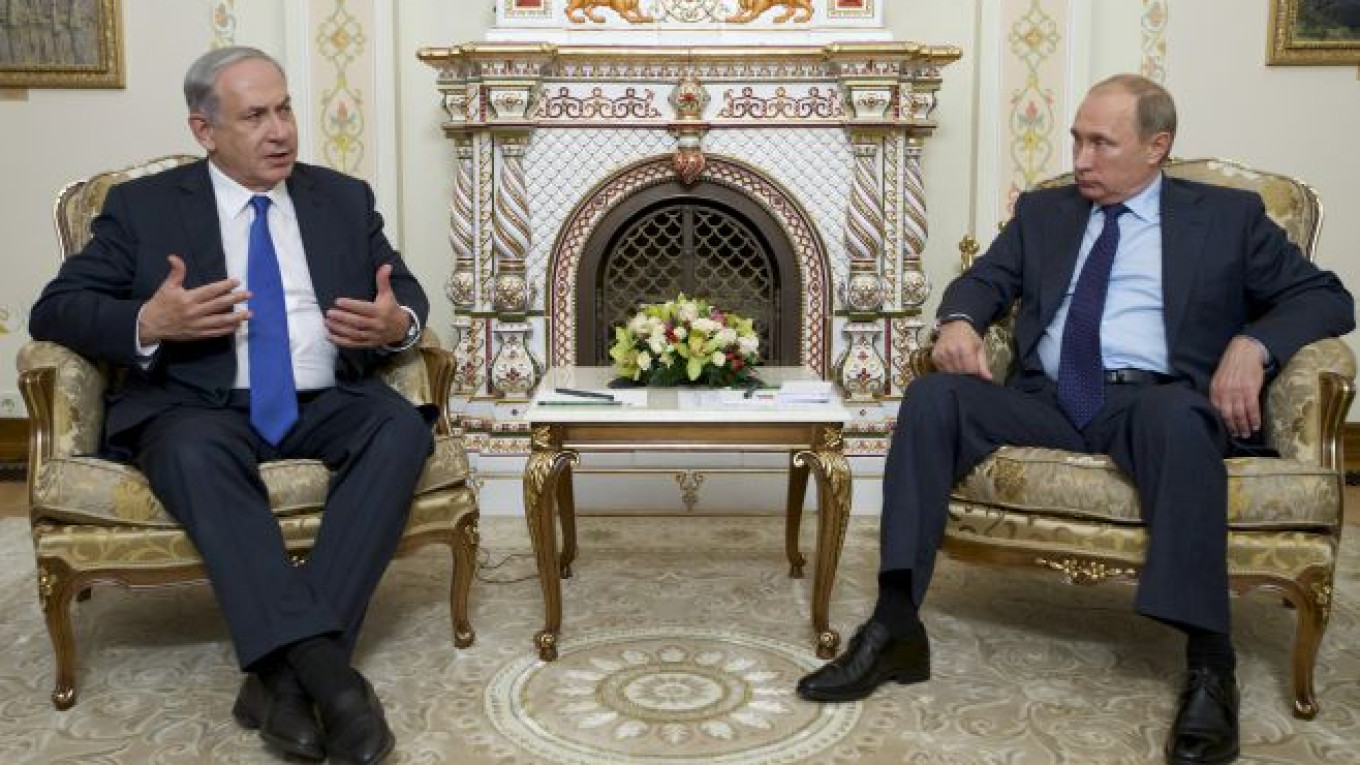President Vladimir Putin sought to assuage Israel's fears of potential Iranian and Syrian aggression, during talks with Israeli Prime Minister Benjamin Netanyahu on Monday that also addressed concerns over Russia's military buildup in Syria.
The two leaders agreed on ways to prevent an unintended confrontation between Israel's military and Russian forces deployed in Syria, Netanyahu told Israeli reporters after the talks, the Haaretz daily reported.
The West suspects that Russia's movement of aircraft, missiles, tanks and other military equipment to Syria is intended to support the government of President Bashar Assad. Russia has insisted that its aim is to help Syria, a longtime ally, fight the Islamic State group and has urged the West to coordinate its efforts with Assad's government as well.
Netanyahu also warned that the Russian military activity in Syria could threaten Israeli forces, echoing a warning issued by the U.S. last week.
At the start of their meeting at Putin's residence outside Moscow, Netanyahu told him that Iran and Syria have been supplying Hezbollah with advanced weapons and are "trying to set up a second terrorist front on the Golan Heights," which Israel captured from Syria and effectively annexed in 1981.
Putin responded by saying the fears of Syrian aggression against Israel were unfounded.
"We know that the Syrian army and Syria as a whole are in such a state that they have no time for a second front. They need to save their own state," Putin told Netanyahu in televised comments. "But still, I understand your concerns."
Netanyahu told Putin that Russia needed to know that Israel would take action to prevent these weapons transfers and thus it was important to make sure there were no misunderstandings between their military forces.
During the talks, they agreed on such a mechanism, the Haaretz report said. "It's enough to imagine the alternative — a dangerous confrontation with Russia, and dealing with these misunderstandings after the fact — to understand the importance of this visit," the Israeli newspaper quoted Netanyahu as saying.
Monday's meeting was the first between the two leaders since November 2013, although they have spoken by telephone three times this year, the Kremlin said.
U.S. Secretary of State John Kerry warned last week that Russia's movement of tactical aircraft and surface-to-air missiles to Syria could pose a threat to American and allied forces fighting IS.
Satellite imagery also has shown the recent arrival of Russian tanks, armored personnel carriers and other military equipment at an air base near the Syrian coastal city of Latakia.
A Message from The Moscow Times:
Dear readers,
We are facing unprecedented challenges. Russia's Prosecutor General's Office has designated The Moscow Times as an "undesirable" organization, criminalizing our work and putting our staff at risk of prosecution. This follows our earlier unjust labeling as a "foreign agent."
These actions are direct attempts to silence independent journalism in Russia. The authorities claim our work "discredits the decisions of the Russian leadership." We see things differently: we strive to provide accurate, unbiased reporting on Russia.
We, the journalists of The Moscow Times, refuse to be silenced. But to continue our work, we need your help.
Your support, no matter how small, makes a world of difference. If you can, please support us monthly starting from just $2. It's quick to set up, and every contribution makes a significant impact.
By supporting The Moscow Times, you're defending open, independent journalism in the face of repression. Thank you for standing with us.
Remind me later.


